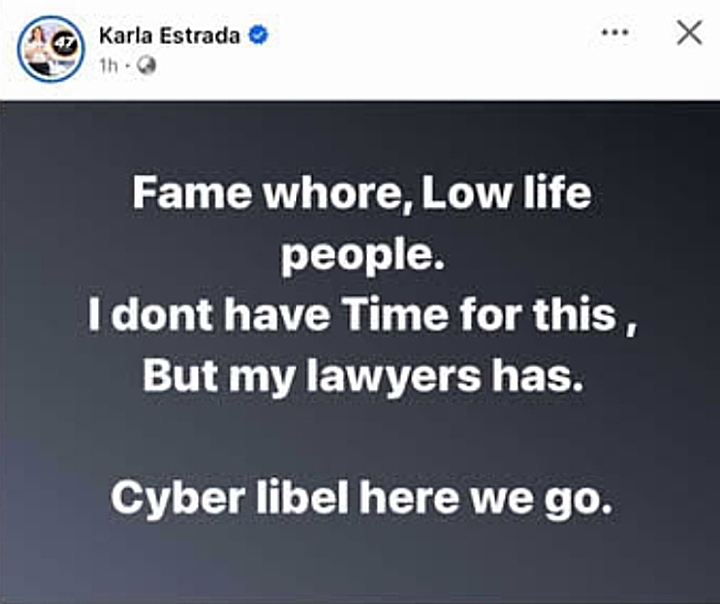Veteran actress and TV host Karla Estrada has taken to social media to address an issue involving what she called a “fame whore,” sparking speculation about a potential legal battle.

In a now-deleted Facebook post that quickly went viral, Estrada warned about taking legal action, saying:
“Fame whore, low life people. I don’t have time for this, but my lawyers have. Cyber libel, here we go.”
The post, though short on details, ignited a wave of speculation among netizens about whom she was referring to.

Netizens have connected Karla’s post to a recent Instagram story from Jellie Aw, the fiancée of Karla’s former partner Jam Ignacio. In her story, Jellie explicitly mentioned Karla’s name, hinting at an incident that affected her professional life.
Jellie wrote: “Karla Estrada, nanahimik ako! Wag mo damay work ko [emoji].”
This has led to speculation that Karla’s Facebook post was a response to Jellie’s remarks, although neither party has confirmed this directly.
Karla and Jam ended their relationship in 2023, with no official explanation provided for the breakup. By August 2024, Jam had introduced Jellie as his new partner, and by November 2024, he proposed to her during a birthday celebration.
Since the split, Karla has remained tight-lipped about her past relationship with Jam. The recent posts, however, have reignited public interest in the situation.
Social media users were quick to react, with some defending Karla’s actions and others calling for clarification. Many questioned whether the post was indeed directed at Jellie or if it involved an entirely unrelated issue.
As of this writing, neither Karla Estrada nor Jellie Aw has issued a statement clarifying the situation. Netizens are awaiting further developments as the story continues to unfold.
Karla Estrada, a prominent figure in the Philippine entertainment industry, has recently made headlines after suggesting she may pursue legal action in response to derogatory remarks made about her online. Known for her roles as a television host, talent manager, and mother to actor Daniel Padilla, Estrada’s career has long been intertwined with public scrutiny. However, the latest wave of online criticism appears to have crossed a line, prompting her to consider more formal measures to address what she describes as harmful and defamatory comments. This development underscores the growing tension between public figures and the unchecked nature of social media discourse, raising questions about accountability in the digital age.
The controversy began when Estrada took to her social media platforms to address what she characterized as baseless and malicious attacks. While she did not specify the exact nature of the comments, her posts hinted at personal insults and false allegations that she claims have damaged her reputation. In one instance, she shared a screenshot of a now-deleted comment, urging followers to “think before they type” and emphasizing the emotional toll such negativity can take. Her decision to publicly call out the behavior reflects a broader trend among celebrities and influencers who are increasingly pushing back against online harassment, rather than silently enduring it.
Legal experts in the Philippines have noted that Estrada’s case could fall under the country’s Cybercrime Prevention Act of 2012, which criminalizes online libel, identity theft, and cyberbullying. Under this law, individuals found guilty of posting defamatory content may face fines or imprisonment. However, enforcing these regulations remains challenging, particularly when perpetrators hide behind anonymous accounts or fake profiles. Estrada’s legal team would need to work with platform providers and law enforcement agencies to trace the source of the comments—a process that can be time-consuming and technically complex. Despite these hurdles, her stance signals a willingness to test the legal system’s capacity to protect individuals from digital abuse.
Public reaction to Estrada’s announcement has been mixed. Many fans and fellow celebrities have rallied behind her, applauding her courage to confront online trolls. Actress and TV host Vice Ganda, for example, voiced support on social media, writing, “No one deserves to be disrespected. Stand your ground!” Others, however, argue that public figures must inherently accept criticism as part of their profession. A segment of netizens has questioned whether legal action is an overreaction, suggesting that blocking or ignoring detractors might be a more practical solution. This divide highlights the ongoing debate over where to draw the line between free speech and harmful speech in online spaces.
The incident also sheds light on the broader issue of cyberbullying in the Philippines, a country with one of the highest social media usage rates globally. According to a 2023 report by the Philippine National Police, cybercrime cases—including online harassment—increased by 35% compared to the previous year. Advocacy groups have long called for stricter enforcement of anti-cyberbullying laws and better digital literacy programs to educate users on responsible online behavior. Estrada’s case may amplify these calls, particularly if it sets a precedent for holding individuals accountable for their digital actions. Her platform as a public figure could bring renewed attention to the emotional and psychological impact of online vitriol.
For Estrada, this is not the first time she has faced public scrutiny. As the mother of Daniel Padilla, a top-tier actor in the Philippines, and as a manager guiding the careers of other rising stars, her life has been under a microscope for years. However, the current situation appears to differ in its intensity and personal nature. In an interview last year, she spoke about the challenges of balancing her public persona with her private life, acknowledging that “not all comments can be brushed off.” Her latest move suggests a shift from passive endurance to active resistance, potentially inspiring others in similar positions to reclaim their narratives.

The entertainment industry’s response to online harassment has evolved in recent years. More celebrities are now partnering with mental health professionals and legal advisors to navigate the pitfalls of fame in the digital era. Workshops on handling cyberbullying and managing online reputations have become commonplace among talent agencies. Estrada’s situation may prompt further institutional changes, such as tighter collaboration between entertainment companies and social media platforms to monitor and mitigate abusive content. This proactive approach could help shield artists and their families from undue harm while preserving the interactive nature of fan engagement.
Critics of legal remedies for online harassment argue that such measures risk stifling free expression. They caution against creating a culture where individuals fear repercussions for voicing opinions, even if they are unpopular or harsh. However, proponents counter that laws against defamation and cyberbullying exist not to silence dissent but to prevent genuine harm. The distinction between constructive criticism and malicious intent, they argue, must be clearly defined to protect both free speech and individual dignity. Estrada’s case may serve as a litmus test for how Philippine courts balance these competing interests in a rapidly evolving digital landscape.
Beyond the legal implications, Estrada’s decision to confront her detractors head-on reflects a cultural shift in how public figures engage with their audiences. Gone are the days when celebrities were expected to remain silent in the face of criticism. Today, platforms like Instagram and Twitter allow stars to communicate directly with fans—and critics—in real time. This democratization of communication has empowered figures like Estrada to challenge false narratives and set the record straight without relying solely on traditional media intermediaries. Yet, it also exposes them to a relentless stream of feedback, both positive and negative.
The psychological impact of online harassment cannot be overstated. Studies have shown that victims of cyberbullying often experience anxiety, depression, and a diminished sense of self-worth. For public figures, whose livelihoods depend on their public image, the stakes are even higher. Estrada’s openness about the emotional toll of the remarks aligns with a growing movement to destigmatize discussions around mental health in the entertainment industry. By sharing her struggles, she not only advocates for herself but also lends a voice to others who may feel powerless against anonymous attacks.
As the situation develops, all eyes will be on how Estrada’s potential legal action unfolds. Will it result in a landmark ruling that strengthens protections against online harassment? Or will it highlight the limitations of existing laws in curbing digital abuse? Whatever the outcome, her case has already sparked necessary conversations about accountability, respect, and the human cost of unchecked online behavior. It serves as a reminder that behind every screen name is a person deserving of basic dignity—a principle that transcends fame, profession, or social status.
In the meantime, Estrada continues to focus on her career and family, refusing to let the controversy derail her professional commitments. Her resilience in the face of adversity has long been a hallmark of her career, from her early days as a singer to her current role as a respected industry figure. This latest chapter in her public life reinforces her reputation as someone unafraid to advocate for herself and others, even when it means venturing into uncharted legal territory. As society grapples with the complexities of digital interaction, her story offers both a cautionary tale and a source of inspiration for navigating the challenges of modern fame.



